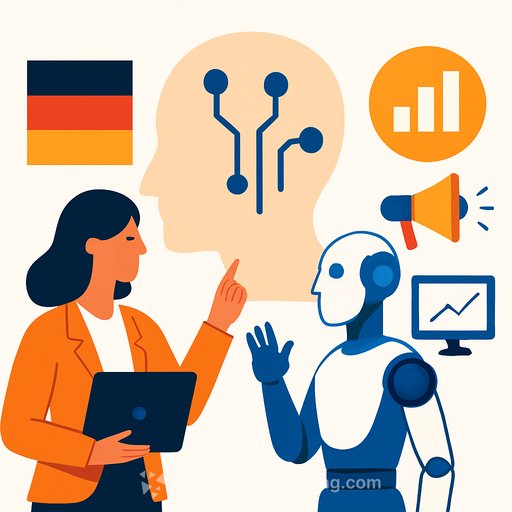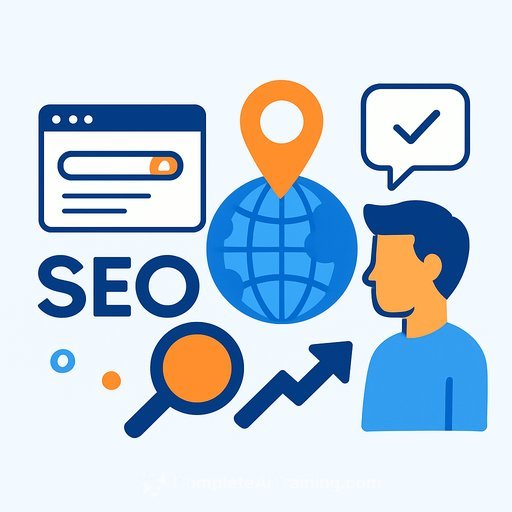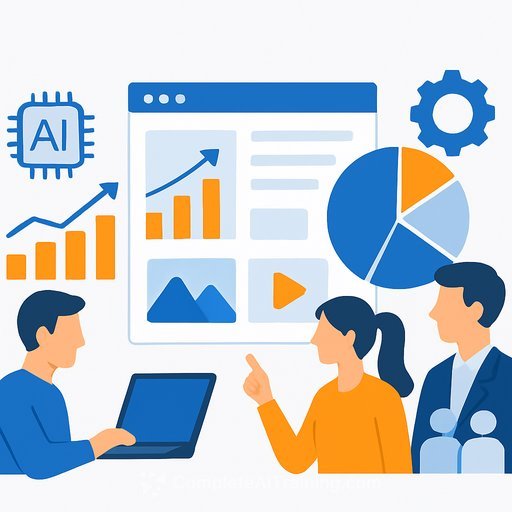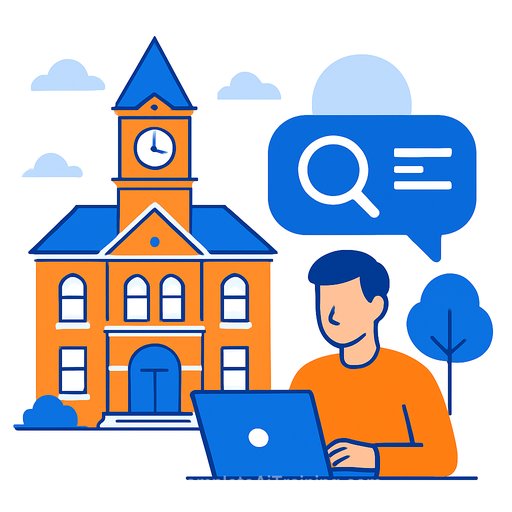Will AI Replace Marketing Jobs in Germany? Here’s What to Do in 2025
Too Long; Didn't Read: AI will not fully replace marketing jobs in Germany by 2025. Generative AI adoption varies widely—35% of 18–29-year-olds use it regularly at work, compared to only 7% of those 65 and older. About 57% of companies engage with AI, with 20% actively using it. Germany’s digital ad spend hits €30.9 billion. To stay competitive, marketers should upskill in AI, data fluency, and GDPR compliance.
AI’s Current Impact on Marketing Work in Germany
AI is no longer theoretical in German marketing. Small and medium-sized manufacturing firms use AI-driven marketing automation to personalize emails, score leads, and trigger workflows, freeing teams from repetitive tasks. Web teams embed machine learning to deliver faster, intent-aware user experiences. AI-powered translation tools help scale multilingual campaigns without losing tone or compliance, though human reviewers remain critical for legal checks and transcreation.
This creates a hybrid workflow: AI handles volume, variants, and optimization, while marketers focus on strategy, creativity, and GDPR-compliant data stewardship.
Market Conditions and Projections for Germany and the EU in 2025
By mid-2025, Germany shows a cautious recovery. The ifo Business Climate index rose slightly to 89.0 in August, signaling improved expectations, but order books remain weak. One in four industrial companies report declining competitiveness compared to non-EU rivals, citing energy costs and regulation as major challenges.
Marketing plans should reflect slower consumer spending and tighter budgets. Prioritize campaigns with measurable ROI and maintain agility as export and order volumes fluctuate.
Marketing Roles Most at Risk in Germany
Entry-level and junior content roles face the most pressure. Tasks like producing high-volume SEO copy, repetitive social media posts, and straightforward localization can be automated quickly. Job listings already blend remote junior roles with AI annotation tasks, shifting focus to model training and automation.
Roles focused on repeatable output rather than strategic thinking, brand stewardship, or complex UX design are most vulnerable.
Marketing Skills and Roles That Remain Valuable
Roles combining strategy, domain expertise, and AI collaboration are safer and higher-value. Senior campaign leads, product marketers, data-savvy brand managers, and compliance-aware localization experts remain essential. The ability to validate AI models, explain outputs, and ensure GDPR compliance is increasingly in demand.
Strong communication, critical thinking, and AI literacy will outweigh raw prompt-writing skills.
Short-Term Actions for Marketers (0–12 Months)
- Conduct a mobile-first audit to optimize key user journeys.
- Choose one localization workflow and one customer-facing AI tool to test in an experiment.
- Use AI-powered translation with human legal and GDPR review to scale multilingual campaigns.
- Deploy a lightweight chatbot to handle routine queries, ensuring clear escalation paths.
- Run two-week A/B tests focused on conversion lift and cost per acquisition, not vanity metrics.
- Use AI to generate social media calendars and localized A/B copy variants, then edit for brand voice.
Mid-Term Career Moves and Upskilling (1–3 Years)
Shift focus from task-level skills to roles blending domain knowledge, data fluency, and governance expertise. Monitor job openings for AI strategy consultants, senior SEO/AI specialists, and AI trainers to gain hands-on experience.
Complement work with formal education. Germany’s universities and professional courses emphasize machine learning, cloud technologies, and cross-disciplinary skills. Plan a two-year roadmap including a public course or master's module, a portfolio project, and certifications covering GDPR-aware AI model checks.
Recommendations for Employers and Policymakers (and How Marketers Can Advocate)
Treat the EU AI Act as a minimum standard. Employers should implement compliance measures and support governance tools and sandboxes that allow SMEs to test AI models safely without excessive bureaucracy.
Address infrastructure gaps by investing in computing power and energy to enable privacy-preserving AI hosted locally.
Marketers can push for clearer sector-specific AI guidelines, procurement policies that support local vendors, and employer-funded upskilling and governance resources.
Resources and Next Steps for Marketers in Germany
Bookmark the ifo Institute for up-to-date macroeconomic and sector insights. Sign up for their newsletter and follow CESifo events for relevant updates.
Consider reaching out to the ifo communications team to propose joint studies or media briefings. Use these resources to stay informed on market-specific developments.
Conclusion: A Practical Roadmap for Marketing Careers in Germany, 2025
The impact of AI on marketing careers in Germany is significant but manageable. AI is integrated into agency and brand workflows, shifting roles from high-volume output to hybrid positions focused on strategy, data fluency, and ethical oversight.
Focus on learning applied AI tools and prompt workflows, building GDPR-compliant projects that demonstrate measurable results. Target roles in AI governance, product marketing, or AI-enhanced SEO where demand and pay are rising.
Frequently Asked Questions
Will AI replace marketing jobs in Germany in 2025?
Not entirely. AI automates routine tasks and adoption is increasing, especially among younger workers. While some entry-level jobs may decline, roles requiring strategy, industry knowledge, and GDPR-aware judgment remain secure. The key is to develop practical AI literacy.
Which marketing roles in Germany are most at risk and why?
Entry-level and junior content roles are at highest risk. Tasks like bulk social media posts, SEO copy, and simple localization can be generated by AI within seconds.
Which marketing skills and roles will be safest and most valuable?
Senior roles blending strategy, domain expertise, and human–AI collaboration are safest. This includes campaign leads, product marketers, brand managers with data skills, compliance-savvy localization specialists, and AI governance practitioners. Critical thinking and communication matter most.
What should marketers do in the short term (0–12 months) to stay relevant?
Start with low-friction, high-impact actions: run mobile-first audits, test AI localization and chatbots with human review, and measure impact rigorously through A/B testing.
What should German employers and policymakers do, and how can marketers advocate?
Operationalize AI Act compliance, fund sandboxes for safe AI testing, and invest in local infrastructure to support privacy-preserving AI. Marketers should advocate for clear sector guidance, employer-funded upskilling, and governance tools.
Your membership also unlocks:






